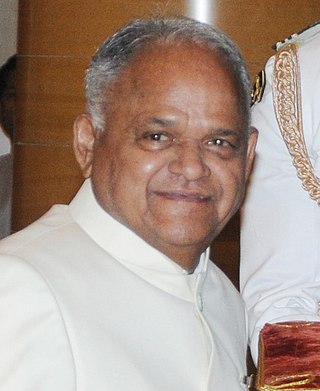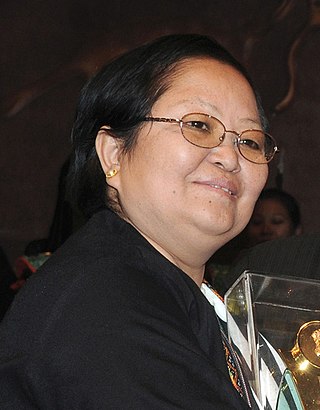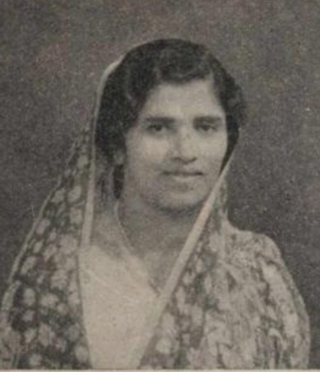
Neelakanta Ramakrishna Madhava Menon was an Indian civil servant, lawyer and legal educator, considered by many as the father of modern legal education in India. He is the founder of National Law Universities system and first director of the National Law School of India University (NLSIU) and the National Judicial Academy, Bhopal and the founder-vice-chancellor of the West Bengal National University of Juridical Sciences (NUJS). He has also served as Chairman of Indian Statistical Institute from 2002 to 2003.

A Baháʼí school at its simplest would be a school run officially by the Baháʼí institutions in its jurisdiction and may be a local class or set of classes, normally run weekly where children get together to study about Baháʼí teachings, Baháʼí central figures, or Baháʼí administration. Baháʼí topics may be minimized in favor of a general curriculum, often with an internationalist form, with accreditation from a variety of sources.
Sardar Patel Vidyalaya (SPV) is an education school located in Lodhi Estate, New Delhi, India. The school is named after a leader of the Indian independence movement, and independent India's first Home Minister and Deputy Prime Minister, Sardar Vallabhbhai Patel.

Madhubani art is a style of painting practiced in the Mithila region of Nepal and North India. Since, this painting as a part of Nepalese Art and Indian Arts are passed on to generations from generations, its place of origin is not exact but it is named after Madhubani, Nepal and Madhubani district of Bihar, India where it is most practised till date in Nepal and India respectively. Lord Ram and Goddess Sita, if legends are to be believed, saw each other for the first time in the forest of ‘Madhuban’ in Dhanusha District — from which the word Madhubani is said to have been derived to name this painting. Artists create these paintings using a variety of mediums, including their own fingers, or twigs, brushes, nib-pens, and matchstick. The paint is created using natural dyes and pigments. The paintings are characterised by their eye-catching geometrical patterns. There is ritual content for particular occasions, such as birth or marriage, and festivals, such as Holi, Surya Shasti, Kali Puja, Upanayana, and Durga Puja.
Duy-Loan T. Le is an engineer and the first woman and Asian elected as a Texas Instruments Senior Fellow.
The Barli Development Institute for Rural Women in Indore is a Baháʼí inspired, though independent residential vocational education school providing programs for women in the vicinity of the city of Indore, India in the state of Madhya Pradesh as well as a base for outreach/non-residential training centers.
Padmanabhan Krishnagopala Iyengar, was an Indian nuclear physicist who is widely known for his central role in the development of the nuclear program of India. Iyengar previously served as the director of BARC and former chairman of the Atomic Energy Commission of India, he raised his voice and opposition against the nuclear agreement between India and the United States and expressed that the deal favoured the United States.
Krishna Kumar is an Indian intellectual and academician, noted for his writings in the sociology and history of education. His academic oeuvre has drawn on multiple sources, including the school curriculum as a means of social inquiry. His work is also notable for its critical engagement with modernity in a colonized society. His writings explore the patterns of conflict and interaction between forces of the vernacular and the state. As a teacher and bilingual writer, he has developed an aesthetic of pedagogy and knowledge that aspires to mitigate aggression and violence. In addition to his academic work, he writes essays and short stories in Hindi, and has also written for children. He has taught at the Central Institute of Education, University of Delhi, from 1981 to 2016. He was also the Dean and Head of the institution. From 2004 to 2010, he was Director of the National Council of Educational Research and Training (NCERT), an apex organization for curricular reforms in India. He was awarded the Padma Shri by the President of India in 2011.
Manju Bharat Ram was an Indian educationist, who was the founder, chairperson of the managing committee and member of the board of trustees, The Shri Ram Schools, New Delhi; ranked as India's No. 1 day school by Education World’s Schools survey in 2008, 2009 and 2011.
Geeta Dharmarajan is an Indian writer, educator and social activist. She is known as the founder of Katha, a "profit for all" social organization and as the Editor in Chief of Katha Press, one of the 10 Top Children's Book Publishers in India in 2022 Katha is also known as a publisher for children in Hindi Her books include Thangam of Mehargarh, Days with Thathu. I am Najar-am-Radh. She is the editor of Katha Prize Stories

Vinod Prakash Sharma was an Indian malariologist and entomologist, known for his work in vector biology and bioenvironmental control of malaria. Recipient of many awards, including the Padma Shri, he was again honoured by the Government of India, in 2014, by bestowing on him the third highest civilian award, the Padma Bhushan.

Binny Yanga was an Indian social worker, a member of the National Planning Commission of India and the founder of Oju Welfare Association (OWA), a non governmental organization based in Arunachal Pradesh, working for the welfare of the weaker sections of the society and campaigning against social Illnesses such as child marriage, forced marriage and dowry. She was honored by the Government of India, in 2012, with the fourth highest Indian civilian award of Padma Shri.

Achamma Mathai was an Indian social worker, women's rights activist, a co-founder of Dr. John Mathai Centre, an institute of Information Technology, Economics, Management, Theatre Arts and Music under the University of Calicut and the wife of John Mathai, the first Railway Minister of India and a former Finance minister. During her stay in Delhi, when her husband was serving in the Union Ministry, she was reported to have been involved in activities related to children's education. During the riots that followed Indian independence, she worked alongside Sucheta Kripalani for the rehabilitation of the riot victims. She served as a member of the Advisory Committee for Libraries in 1955 and as the chairperson of the Central Social Welfare Board in the early Sixties. The Government of India honoured her in 1954, with the award of Padma Shri, the fourth highest Indian civilian award for her contributions to the society, placing her among the first recipients of the award.
Shalini Moghe was an Indian educationist, social worker and the founder of Kasturba Kanya School for tribal children and Bal Niketan Sangh, the first Montessori school in the state of Madhya Pradesh. She was the chairperson of the Bharatiya Grameen Mahila Sangh, Indore, a national level non governmental organization working for the welfare and education of the disabled, orphans, under privileged and the economically weaker sections of the society and was involved with other Indore-based educational institutions such as Prestige Public School and Pragya Girls School. A winner of the Jamnalal Bajaj Award in 1992, she was honoured by the Government of India in 1968, with the award of Padma Shri, the fourth highest Indian civilian award for her contributions to the society.
Chitra Jayant Naik (1918–2010) was an Indian educationist, writer, social worker, the chairperson of the Indian Institute of Education and the expert member of the Planning Commission of India. She was the chairperson of the Non-formal Education Committee set up by the Ministry of Human Resource Development and was a member of the National Literacy Mission. The Government of India awarded her the fourth highest Indian civilian honour of Padma Shri in 1986.
Lila Firoz Poonawalla is an Indian industrialist, philanthropist, humanitarian and the founder of Lila Poonawalla Foundation, a non governmental organization promoting professional education among aspiring girls in India by providing scholarships and guidance. She is one of the pioneering Indian woman to secure a professional degree in Mechanical Engineering from College of Engineering Pune (COEP) and is a former chairperson of Alfa Laval India and TetraPak India. She was awarded the fourth highest civilian award of Padma Shri by the Government of India in 1989, the Order of the Polar Star by Carl XVI Gustaf, the King of Sweden, in 2003 and Royal Order of the Polar Star – Commander 1st Class in 2019.
Keepu Tsering Lepcha is an Indian social worker, educationist, former civil servant and the founder of the Human Development Foundation of Sikkim (HDFS), a non governmental organization serving the socio-economically challenged people of Sikkim. A former secretary of the Government of Sikkim, she has served as the project director in the Rural Development Agency of the government. She is a member of the PeaceWomen Across the Globe organization which was shortlisted for the Nobel Peace Prize of 2005, and a recipient of the 2012 Real Heroes Award of the Reliance Foundation and the 2013 Senior Citizen Award of the CNN-IBN. The Government of India awarded her the fourth highest civilian honour of the Padma Shri, in 2009, for her contributions to society.
N. Srinivasa Iyer Ramaswamy (1926–2012), popularly known as Cartman Ramaswamy, was an Indian engineer, educationist, management academic and writer, and the founder director of the Indian Institute of Management, Bangalore. He was the founder of Centre for Action, Research and Technology for Man, Animal and Nature (CARTMAN), a non governmental organization working for region-relevant and appropriate technology transfer to rural areas and Indian Heritage Academy, an organization involved in propagating Indian cultural traditions. He was also the founder chairman of the Adarsh Vidya Kendra (AVK) Group of educational institutions. The Government of India awarded him the third highest civilian honour of the Padma Bhushan, in 2006, for his contributions to society.
Akshay Kumar Jain (1915–1993) was an Indian independence activist, writer, journalist and the editor of Navbharat Times, a Hindi-language daily owned by The Times Group. He was one of the founders of the National Union of Journalists (India) and held the chair of its reception committee when the organization was formed in 1972.

Sushil Kumar Jain known professionally as Sushil Doshi is an Indian journalist, writer, sports commentator and the first cricket commentator in Hindi. Born to Niranjanlal and Madan Kunwar at Indore, in the second largest Indian state of Madhya Pradesh, he graduated in engineering from Shri Govindram Seksaria Institute of Technology and Science (SGSITS) Indore and started his commentating career in 1968 at the Nehru Stadium for a Ranji Trophy match between Madhya Pradesh and Rajasthan. Over the years, he is reported to have covered nine Cricket World Cups, 85 test matches and over 400 One Day Internationals, besides several Twenty20 Internationals. His contributions are reported in making cricket commentary in Hindi popular. He has also written two books in Hindi on sports, Khel Patrakarita published in 2003 and Cricket Ka Mahabharat, published in 2016.







